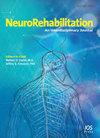The effects of visual information deprivation and feedback balance training on balance in patients with stroke
IF 1.7
4区 医学
Q3 CLINICAL NEUROLOGY
引用次数: 0
Abstract
BACKGROUND: Patients with stroke depend on visual information due to balance deficits. Therefore, it is believed that appropriate visual deprivation training could have an impact on improving balance abilities. OBJECTIVE: The purpose of this study was to compare the effects of balance training performed in visual deprivation and feedback conditions on balance in stroke survivors. METHODS: The 39 participants were randomly assigned to either the Visual Deprivation Group (VDG; n = 13), the Visual Feedback Group (VFG; n = 13), or the Control Group (CG; n = 13). The training sessions were conducted five times a week for three weeks. Participants completed the Berg Balance Scale (BBS), Timed Up and Go test (TUG), Four Square Step Test (FSST), and Limit of Stability (LOS) assessments. RESULTS: The VDG showed significant improvements in BBS, FSST, TUG, and LOS. In VFG, significant improvements were observed in BBS and TUG. There were statistically significant differences among the groups in all variables related to balance. CONCLUSION: The results of this study suggest that balance training under visual deprivation is effective in improving static and dynamic balance and gait in patients with stroke. In other words, patients with stroke need to reduce their over-reliance on visual information.视觉信息剥夺和反馈平衡训练对脑卒中患者平衡能力的影响
背景:中风患者因平衡障碍而依赖视觉信息。因此,人们认为适当的视觉剥夺训练可对提高平衡能力产生影响。目的:本研究旨在比较在视觉剥夺和反馈条件下进行的平衡训练对中风幸存者平衡能力的影响。方法:39 名参与者被随机分配到视觉剥夺组(VDG;n = 13)、视觉反馈组(VFG;n = 13)或对照组(CG;n = 13)。训练课程每周进行五次,为期三周。参加者完成了伯格平衡量表(BBS)、定时上下楼测试(TUG)、四方步测试(FSST)和稳定极限(LOS)评估。结果:VDG 在 BBS、FSST、TUG 和 LOS 方面均有显著改善。在 VFG 中,BBS 和 TUG 有明显改善。在与平衡相关的所有变量中,各组之间均存在统计学意义上的显著差异。结论:本研究结果表明,视觉剥夺下的平衡训练能有效改善脑卒中患者的静态和动态平衡及步态。换句话说,脑卒中患者需要减少对视觉信息的过度依赖。
本文章由计算机程序翻译,如有差异,请以英文原文为准。
求助全文
约1分钟内获得全文
求助全文
来源期刊

NeuroRehabilitation
CLINICAL NEUROLOGY-REHABILITATION
CiteScore
3.20
自引率
0.00%
发文量
178
审稿时长
6-12 weeks
期刊介绍:
NeuroRehabilitation, an international, interdisciplinary, peer-reviewed journal, publishes manuscripts focused on scientifically based, practical information relevant to all aspects of neurologic rehabilitation. We publish unsolicited papers detailing original work/research that covers the full life span and range of neurological disabilities including stroke, spinal cord injury, traumatic brain injury, neuromuscular disease and other neurological disorders.
We also publish thematically organized issues that focus on specific clinical disorders, types of therapy and age groups. Proposals for thematic issues and suggestions for issue editors are welcomed.
 求助内容:
求助内容: 应助结果提醒方式:
应助结果提醒方式:


